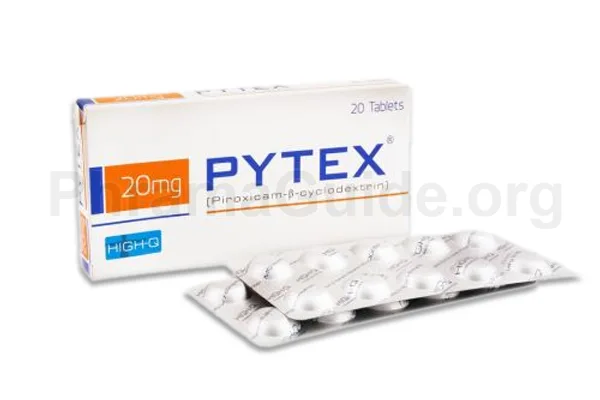Pytex tablet is a nonsteroidal anti-inflammatory drug (NSAID) that is primarily used for the treatment of pain, inflammation, and swelling associated with various conditions, such as:
- Arthritis: Pytex tablet is commonly used for the management of rheumatoid arthritis and osteoarthritis. It helps reduce pain, inflammation, and stiffness in the joints, improving mobility and overall quality of life for individuals with these conditions.
- Musculoskeletal Disorders: Pytex tablets can be used to relieve pain and inflammation associated with musculoskeletal disorders such as tendonitis, bursitis, sprains, strains, and other soft tissue injuries.
- Gout: Pytex tablets may be used in the treatment of acute gouty arthritis, a painful condition caused by the deposition of uric acid crystals in the joints. It helps reduce pain, inflammation, and swelling during gout attacks.
- Dysmenorrhea: Pytex tablets can be used to alleviate menstrual pain (dysmenorrhea) in women. It helps reduce the intensity of uterine contractions and associated pain.
- Postoperative Pain: Pytex tablets may be used as part of postoperative pain management following surgical procedures to help control pain and reduce inflammation.
Off-label Uses of Pytex Tablet
- Cancer-related Pain: Pytex tablet has been used off-label to manage pain associated with certain types of cancer, such as bone pain caused by metastasis. It may help reduce inflammation and alleviate pain in some cases.
- Migraine: Pytex tablet has also been used off-label for the acute treatment of migraines. It may help relieve the pain and inflammation associated with migraines in some individuals.
- Dental Pain: Pytex tablet may be used off-label to manage dental pain, including pain after dental procedures or tooth extraction. It may help reduce pain and inflammation in the oral cavity.

What is Pytex?
Pytex is one of the leading brands of Piroxicam-β-cyclodextrin, manufactured and marketed by High-Q Pharmaceuticals (Pvt) Ltd, Pakistan.
Pytex Alternatives : Other Similar Brands
The following are some alternative brands of Pytex and their manufacturers.
- Berxin : Chiesi Pakistan.
- Feldene : Pfizer Laboratories Inc.
- NYSA : Getz Pharmaceuticals ( Pvt) Ltd, Pakistan.
- Cyclodex : Platinum Pharmaceuticals ( Pvt) Ltd, Pakistan.
- Pirexin : Saffron Pharmaceuticals (Pvt) Ltd, Pakistan.
- Boshcam B : Bocsh Pharmaceuticals ( Pvt) Ltd, Pakistan.
- Briax : AGP Pharma, Pakistan.
- Bexagen : Genesis Pharmaceuticals, Pakistan.
- Felbex : Martindow, Pakistan.
- Antixin : Bio-Labs (Pvt) Ltd, Pakistan.
Pytex : Available Formulations and Strengths
Presently, Pytex is available in Tablet Form.
Pytex Tablet : 20mg strength.
Who Should Not Use Pytex?
Pytex has certain contraindications, which are specific situations or conditions in which the use of Pytex is not recommended due to potential risks or adverse effects.
Allergy or hypersensitivity: Pytex should not be used in individuals who have a known hypersensitivity or allergy to Pytex or any other nonsteroidal anti-inflammatory drugs (NSAIDs). Allergic reactions to NSAIDs can range from mild skin reactions to severe allergic reactions, including anaphylaxis, which is a potentially life-threatening condition.
History of asthma, allergic rhinitis, or nasal polyps: Pytex should be used with caution in individuals with a history of asthma, allergic rhinitis (hay fever), or nasal polyps. NSAIDs, including Pytex, can trigger or worsen asthma symptoms, cause respiratory difficulties, or induce allergic reactions in susceptible individuals.
Active peptic ulcer or gastrointestinal bleeding: Pytex can increase the risk of peptic ulcers or gastrointestinal bleeding. Therefore, it is contraindicated in individuals with an active peptic ulcer or a history of recurrent peptic ulcers, gastrointestinal bleeding, or perforation.
Severe liver or kidney impairment: Pytex is metabolized in the liver and eliminated through the kidneys. Individuals with severe liver impairment or severe kidney impairment may have difficulty metabolizing and eliminating Pytex, leading to an increased risk of adverse effects. Therefore, Pytex should be used with caution or avoided in such cases.
The third trimester of pregnancy: Pytex is generally contraindicated in the third trimester of pregnancy as it may increase the risk of complications for both the mother and the fetus, including premature closure of the fetal ductus arteriosus and reduced amniotic fluid volume.
What is the Recommended Daily Dosage of Pytex?
- Pytex Dose for Osteoarthritis and Rheumatoid Arthritis:
- One Tablet of 20mg per day as a single dose.
- Pytex Dose for Acute Pain and Musculoskeletal Conditions:
- Initial dose: One Tablet of 20mg per day, twice a day.
- Maintenance dose: 1 to 2 Tablets of 20mg, depending on the individual’s response and tolerability.
- Pytex Dose for Dysmenorrhea (Menstrual Pain):
- One Tablet of 20mg per day.
- Treatment is usually started a few days before the expected onset of menstruation and continued for a few days after.
How Pytex Works?
Pytex works by inhibiting the activity of cyclooxygenase enzymes, specifically the COX-1 and COX-2 enzymes. These enzymes are responsible for the conversion of arachidonic acid into prostaglandins. By inhibiting COX enzymes, Pytex reduces the production of prostaglandins, which are key mediators of inflammation and pain.

Leave A Comment